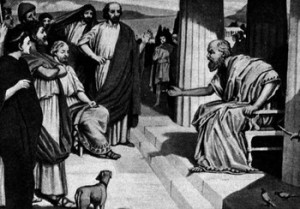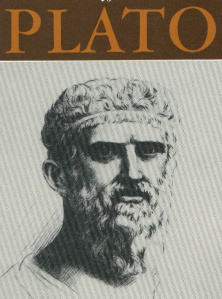Socrates and Plato would shudder if they were around today to see what Common Core Standards have done to critical thinking. I’d like to think they would be leading a protest of some epic proportion. I’m sure they could be successful at raising the people’s attention

to the issue of usurping education. I’m pretty sure that both would certainly cry “Foul!” when it comes to the level of ‘thinking and reasoning’ happening in Common Core classrooms–especially when it comes to critical skills.

The problem: Today’s critical thinking is NOT what our ancestors had in mind!
According to the “Critical Thinking Movement” website, Socrates is credited with discovering probing questions. He also encouraged folks to question authority. After all, just because they are in a powerful position DOESN’T mean they are smarter than those they govern. Socrates also developed how to use evidence, examination of reasoning, analyzing, and the skill of what to do with implications. Plato, of course, was the student of Socrates and is the one who wrote down all Socrates words. Between the both, they pretty much set the standard way we’ve taught each other since then when it comes to ‘reflectively question common beliefs and explanations, carefully distinguishing those beliefs that are reasonable and logical from those which — however appealing they may be to our native egocentrism, however much they serve our vested interests, however comfortable or comforting they may be — lack adequate evidence or rational foundation to warrant our belief.’
Today’s Common Core Standards would like to have us think like the great thinkers, but the honest truth is, the Standards are abysmal in this area. Common Core seeks to have us conform to common group based beliefs, to think in an agenda mindset that’s not our own. How do I know this? CCSS is missing the ONE thing Socrates and Plato had going for them..empirical evidence. Consider this bit of knowledge (also from the Critical Thinking Movement website which I will paraphrase)
According to those directing the exercises requiring critical thinking, motivations can be manipulated to suit the ‘vested interests’. This totally discounts any fair minded person. It also promotes selfishness. Critical thinking is not a ‘one-size-fits-all’ subject and it certainly is not able to be carried out in the same way in all people. The level of critical thinking is very much dependent on a number of factors involved. If someone has a learning disability, critical thinking will be markedly different than someone who doesn’t have one. Those younger than others will have almost no critical thinking skills as they are not yet mature enough. To learn to think well, critically, you need many years, perhaps a lifetime.
Plato’s ‘Allegory of the Cave’:
While this allegory, when traditionally taught, isn’t for younger students, it should be high school or college classes. However, I’m using it as an example of the shift in critical thinking. First, watch this short You Tube video:
[youtube https://www.youtube.com/watch?v=LTWwY8Ok5I0&w=560&h=315]
Then, consider these questions, NOT aligned to Common Core, a) What justice is described in the allegory? b) How would you relate this allegory to some of Plato’s other works? c) Since it’s been established Plato loved truth, what truth do you suppose he was conveying here? d) Where will you find the “Allegory of the Cave” in the Plato’s Republic? Of the 3 allegories Plato wrote, this one is the most __________________? (As to the first 3 questions, these would be various answers depending on your students; you’ll find the Cave allegory in book 7, and it was the most interesting of the Allegory of the Sun, The Dividing Line, and Allegory of the Cave). The text explains the the ‘Allegory of the Cave’ is about many truths, such as religion, education, perception, etc.
A pre-CCSS look at Plato, https://journals.lib.byu.edu/spc/index.php/StudiaAntiqua/article/viewFile/11647/11649)
Plato as per CCSS:
Now, check out the modern, CCSS spin for the same allegory which is set to be taught to 10th graders, a) “After reading Plato’s “Allegory of the Cave,” write a community newspaper article in which you analyze the allegory of the cave as an allegory for education, providing examples to clarify your analysis.” b) “The seminar text for this module is the excerpt from Plato’s The Republic commonly known as “The Allegory of the Cave.” The written product that students will produce as a final product is an essay that analyzes what “The Allegory of the Cave” teaches us about the value of an education. The initial audience is each student’s parents or guardians, and this essay is intended to be used as a starting point for a serious discussion between students and their parents/guardians about their ambitions for the future”. (source:http://www.paideia.org/wp-content/uploads/2014/03/True-and-Good-Allegory-of-Cave-Module.pdf) **Did you notice the CCSS quote, in one line, didn’t use proper punctuation where the title of Plato’s work is concerned?!**
Contrast that 10th grade assignment with this first grade resource of Plato’s “Allegory of the Cave” (click to enlarge the picture):

The more I tried to find other CCSS aligned assignments for this particular work of Plato’s the more ridiculous the resources became. What only needs reading and/or viewing, followed with discussion has been turned into a 3 ring circus of too much fluff and not enough substance! I mean, seriously, I saw ‘flipped classroom honors plans that go from the simple work of reading and understanding to let’s find any possible shred of something connected to Plato, but then, not really and let’s throw it in there…especially if it’s a TEDTalk! I saw plans for first grade, fourth grade, fifth grade, tenth grade, twelfth grade. Did you notice the ‘theme’ to the ‘before and after’ CCSS when it came to the “Allegory of the Cave”? Real questions for real thinking in the ‘beforeCCSS’, absolutely no questions in the ‘after’, but an assignment for a community newspaper. Totally leaving out some of the most valid critical thinking points from the allegory and focusing in on ‘education’. Nice, work, Common Core..no agenda hidden there, is it?!
The solution:
In my opinion, the solution to true critical thinking is NOT Common Core, nor is it a modern approach. Rather, go back to the masters, the tried, the true. Let’s remember that because each person is so different, thinking skills, especially critical cannot begin too soon and cannot be too difficult. Just like running before you learn to walk..IF it happens, it usually doesn’t work as good as if you take walking in small, orderly steps before running. Not every person should think the same, let alone be taught in a group setting how to accomplish something so personal as the thought process. Certainly, cover the appropriate portions of the subject that are best suited for groups AND then take the more personal portions and approach those differently.
There needs to be a return to sanity in how sensitive things like critical skills are taught. Yes, with thinking, you can go both ‘deep’ and ‘broad’ in it!! In fact, the brain is well suited for in-depth thinking and/or not so in-depth. We need to ditch the lie that there’s a preference between ‘deep’ and ‘broad’ (as in the tired, worn out buzz phrase ‘an inch wide and a mile deep’) Sometimes you need an inch deep and a mile wide, sometimes you don’t.
True critical thinking, at least from Socrates and Plato’s view, welcomed all kinds of thinking. The beauty wasn’t in the quantity of thought or how ‘deep’ the thought, it was are you questioning the status quo? Are you seeking out truth? Why? Because back then, just as today, TRUTH stands the test of time; TRUTH wins over lies; TRUTH needs no scandal, re-alignment, or trumped out, fussy lessons full of hot air. TRUTH divides, that is a fact, but from what I’ve learned about CCSS, we not only should be divided from it, we should have CCSS laid to rest in a hemlock box. Then, I’d let Socrates, Plato, and our newly liberated students dance on that hemlock box.



1 thought on “WYBI Wednesday: CCSS and Critical Thinking”